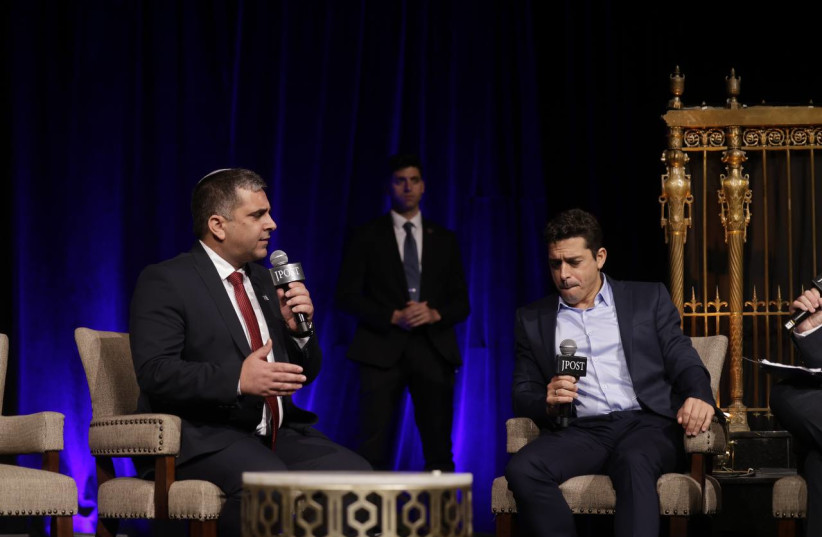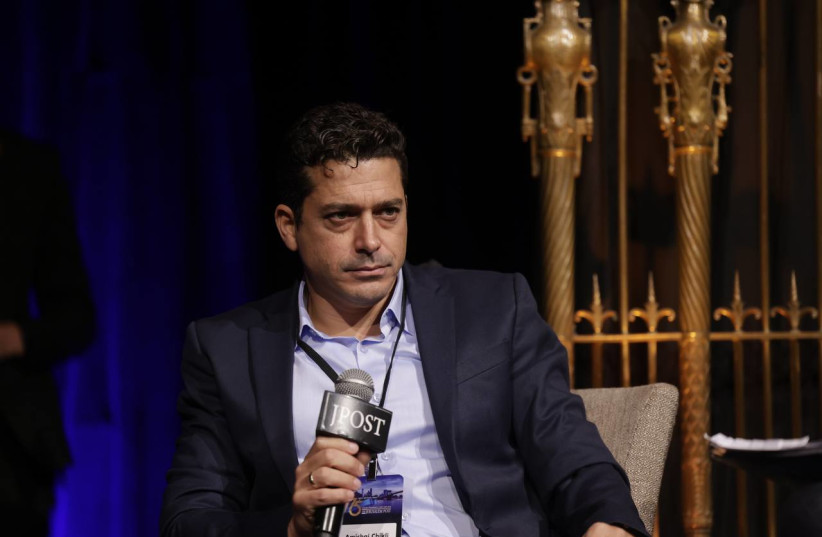Diaspora Affairs and Combating Antisemitism Minister Amichai Chikli (Likud) has two reservations regarding the White House Strategy on Combating Antisemitism, he said at The Jerusalem Post Annual Conference in New York on Monday.
Chikli told the Post that the Israeli government has a concrete plan. He spoke on a panel with Aliyah and Integration Minister Ofir Sofer (Religious Zionist Party – RZP), who spoke of the state of aliyah, and mentioned the launching of a program to promote subsidized college education in Israel for Diaspora Jews.
“It is important that they say that this is the most important and central definition,” Chikli said of the recognition of the International Holocaust Remembrance Alliance (IHRA) definition of antisemitism in the White House plan, but explained that he was disappointed with the fact that an additional definition of antisemitism was included, which is more progressive and doesn’t see anti-Zionism as antisemitism.

“It is bad that they opened the door for irrelevant definitions,” he said, adding that the White House also added an “irrelevant organization like the anti-Israel, antisemitic CAIR [Council on American-Islamic Relations] to be part of this program.”
He said that the “poor Jewish education [in the US] makes it difficult to combat antisemitism,” and that he hopes to strengthen Jewish education in North America through a new program.

Chikli is expected to be meeting with the staff of US Special Envoy to Monitor and Combat Antisemitism Ambassador Deborah Lipstadt in Washington this week.
Both ministers marched in the Celebrate Israel Parade on Sunday, celebrating Israel’s 75th Independence Day. “It was a great first experience to march in the parade,” Sofer said. “I felt proud of our people and our nation, and to help strengthen the connection of Israeli society to the American Jewish community and of American Jews with Israel. It was great!”
As reported by the Post, about 200 anti-judicial-reform activists, mainly Israelis, demonstrated against the ministers who participated.
“It’s not about Israel investing in Diaspora or Diaspora investing in Israel, it’s about the Jewish people investing in the Jewish people.”
Amichai Chikli
“It was an amazing experience with good vibes and good music, and I made sure everyone smiled,” Chikli said.
Sofer added that “we will work together with the American Jewish community for the same target, which is to strengthen the Jewish community and strengthen aliyah.”
AS REVEALED by the Post, The Diaspora Affairs and Combating Antisemitism Ministry will invest NIS 150 million in establishing a new project to substantially expand the number of children in Jewish day schools in North America. Chikli unveiled the project, titled “Aleph Bet,” during a briefing in the Knesset a few weeks ago.
“Throughout generations, Jewish education was top priority,” Chikli said. “What you learn as a child you will never forget,” he said, quoting a Talmudic phrase. The Diaspora Affairs and Combating Antisemitism minister shared that only 20% of American Jewish children attend Jewish day schools, but most of them are Orthodox Jews. According to Chikli, if you survey non-Orthodox American Jews, only 5% attend formal Jewish education schools. “How can we secure Jewish life in the US when this is the situation?” he asked, adding that “we can change this situation.”
He gave an example of the work of the Jewish Federations in Canada, mainly Toronto and Montreal, that solved their crisis in Jewish education attendance. He mentioned The Anne & Max Tanenbaum Community Hebrew Academy of Toronto (TanenbaumCHAT), which doubled the number of students after a few years of decline.
“The Jewish Federation decided that education is its top priority; they brought in donors and established an endowment that made tuition cheaper by a third,” he said. “It worked. We want to take this Jewish Canadian model to work with the teachers, and the Jewish federations that chose to partner with us will match the funds. We will only work with those who want to work with us; we cannot force anyone to join us or to dictate anything.
“It’s not about Israel investing in Diaspora or Diaspora investing in Israel, it’s about the Jewish people investing in the Jewish people,” Chikli said: “It’s us investing in us.”
SOFER SAID that during his tenure, he will promote efforts for increasing aliyah from Western countries “We will focus our efforts on Western aliyah. I don’t think it will be easy to cause a large wave of aliyah from Western countries, but it is our duty to do so. We can do it.
“One thing we have planned is offering subsidized programs for young Jews in the Diaspora to study in Israeli universities in different periods of time. If they learn in an Israeli university, there are very big chances for [them to make] aliyah. Increasing the numbers of students from the Diaspora in Israel can be a great goal and I believe they will make aliyah – I believe we will see good results.” He mentioned programs that have succeeded at this, such as the Masa Israel and Naaleh programs, both subsidized by the government.
Regarding the Law of Return, Sofer assured the audience that it “won’t change in the near future,” adding that he hopes to “deepen the dialogue with Jewish communities” on this topic, as well as with different parts of Israeli society. “If the dialogue is deeper, we will have better results. I won’t explain this at the moment, but we hope to establish a committee to define the [the criteria for] aliyah to Israel.”
Chikli on Law of Return
Chikli also spoke about the Law of Return, since there were members of the coalition that have suggested an amendment of the Grandchild Clause that allows anyone who has at least one Jewish grandparent to make aliyah. “It’s a very delicate subject,” he said, explaining that “we have half a million non-Arab, non-Jewish Israeli citizens,” mainly immigrants from former Soviet Union countries who aren’t considered Jewish according to the Halacha (Jewish law), but were eligible according to the Law of Return.
“In the past, most of the people that made aliyah were largely Jewish. We had no challenge. But as time goes by, tens of thousands of people who have immigrated in the past few years, mainly from former Soviet Union states, aren’t even affiliated” – meaning that they have no real connection to Judaism at all, besides not being acknowledged as Jews.
Chikli reiterated what Sofer said at the conference, saying that he is considering the establishment of a committee on the matter, to discuss the issue in a delicate way. “Through this committee, we need to have a better process to make sure that those who want to come to the State of Israel want to be part of Israel and want to be one of us,” Chikli said, adding that he hopes they “won’t be just be taking advantage of obtaining an Israeli passport and then move to Canada a few months later.”